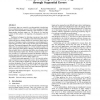Free Online Productivity Tools
i2Speak
i2Symbol
i2OCR
iTex2Img
iWeb2Print
iWeb2Shot
i2Type
iPdf2Split
iPdf2Merge
i2Bopomofo
i2Arabic
i2Style
i2Image
i2PDF
iLatex2Rtf
Sci2ools
ASPLOS
2011
ACM
2011
ACM
ConSeq: detecting concurrency bugs through sequential errors
Concurrency bugs are caused by non-deterministic interleavings between shared memory accesses. Their effects propagate through data and control dependences until they cause software to crash, hang, produce incorrect output, etc. The lifecycle of a bug thus consists of three phases: (1) triggering, (2) propagation, and (3) failure. Traditional techniques for detecting concurrency bugs mostly focus on phase (1)—i.e., on finding certain structural patterns of interleavings that are common triggers of concurrency bugs, such as data races. This paper explores a consequence-oriented approach to improving the accuracy and coverage of state-space search and bug detection. The proposed approach first statically identifies potential failure sites in a program binary (i.e., it first considers a phase (3) issue). It then uses static slicing to identify critical read instructions that are highly likely to affect potential failure sites through control and data dependences (phase (2)). Finall...
| Added | 24 Aug 2011 |
| Updated | 24 Aug 2011 |
| Type | Journal |
| Year | 2011 |
| Where | ASPLOS |
| Authors | Wei Zhang, Junghee Lim, Ramya Olichandran, Joel Scherpelz, Guoliang Jin, Shan Lu, Thomas W. Reps |
Comments (0)

